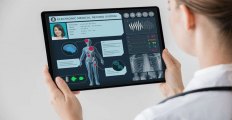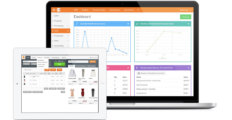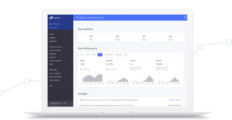In the fast-paced world of healthcare, cloud computing has emerged as a revolutionary technology. This technology allows healthcare providers to store and access large amounts of data remotely. By embracing cloud computing, the healthcare industry is witnessing a transformation in how it handles data storage and access, leading to enhanced patient care and operational efficiency.

What is Cloud Computing?
Cloud computing refers to the delivery of various services through the Internet. These resources include tools and applications like data storage, servers, databases, networking, and software. Rather than keeping files on a proprietary hard drive or local storage device, cloud-based storage makes it possible to save them to a remote database. As long as an electronic device has access to the web, it has access to the data and the software programs to run it.
Cloud Computing in Healthcare
The healthcare industry generates a massive amount of data. This includes patient medical records, imaging data, and notes from healthcare providers. Managing this data has traditionally been a challenge due to the need for substantial physical storage and concerns about security and privacy. Cloud computing offers a solution by providing large-scale data storage, improved accessibility, and enhanced security measures.
Advantages
- Scalability: Scalability in cloud solutions is a vital feature for healthcare providers, as it allows them to adjust their data storage and computing resources to meet fluctuating demands. In the dynamic field of healthcare, where patient data volumes can grow rapidly, the ability to scale up ensures that the IT infrastructure can keep pace with increased loads without the need for significant capital investment in physical hardware. Conversely, during periods of lower demand, systems can be scaled down to reduce costs, maintaining operational efficiency. This scalability is especially crucial for supporting the growth of healthcare organizations, whether it involves expanding to new locations, accommodating more patients, or integrating new digital health services. Cloud scalability offers a flexible and responsive approach to managing the vast and growing amounts of healthcare data, from electronic health records to imaging studies, ensuring that resources are optimized according to current needs.
- Accessibility: Cloud computing transforms how healthcare professionals access and use patient data. With cloud-based systems, data is no longer confined to a specific physical location; instead, it’s accessible in real-time from anywhere with an internet connection. This accessibility is a game-changer for healthcare providers, facilitating enhanced collaboration among different professionals, such as doctors, nurses, and specialists. Whether in a hospital, a remote clinic, or in the field, healthcare providers can access up-to-date patient records, ensuring that the care provided is based on the latest information. This real-time access is particularly crucial in emergencies where immediate access to patient data can be lifesaving. Moreover, it enables telemedicine and remote monitoring, allowing healthcare professionals to deliver care to patients who cannot physically visit healthcare facilities. This accessibility not only makes patient care more efficient and coordinated but also improves patient outcomes by ensuring that all healthcare providers are working from the most current and comprehensive information.
- Cost-Effectiveness: Cloud computing offers significant cost benefits to healthcare providers. Traditional IT infrastructures require substantial capital investment in physical servers, storage devices, and the necessary space to house them. These infrastructures also incur ongoing costs for maintenance, energy consumption, and periodic upgrades. By contrast, cloud services operate on a pay-as-you-go model, significantly reducing the need for upfront capital expenditure. Healthcare organizations can avoid the costs associated with purchasing, maintaining, and updating physical hardware and data storage systems. Instead, they can allocate resources to pay for only the cloud services they use, which can be adjusted as needs change. This model not only reduces direct costs but also frees up organizational resources and personnel, allowing them to focus more on patient care and less on IT infrastructure management. The cost-effectiveness of cloud computing is particularly beneficial for smaller healthcare providers who might not have the resources for large-scale IT investments, enabling them to leverage advanced technologies affordably and efficiently.
- Security: In the healthcare sector, where data sensitivity is paramount, cloud computing offers robust security features. Cloud providers recognize the critical nature of protecting healthcare data, which often includes confidential patient information, and invest heavily in advanced security measures. These measures typically include strong encryption protocols for data in transit and at rest, ensuring that patient information is safeguarded from unauthorized access. Additionally, cloud providers implement various security layers, including firewalls, intrusion detection systems, and regular security audits, to protect against cyber threats. The heightened focus on security in cloud computing is crucial in complying with regulations like HIPAA (Health Insurance Portability and Accountability Act), which mandates strict standards for patient data privacy and security. Furthermore, the centralized nature of cloud security management means that updates and patches can be applied more consistently and quickly across the entire system, ensuring that security measures are always up-to-date. This comprehensive and proactive approach to security in cloud computing provides healthcare organizations with the confidence that their sensitive data is well protected.
- Data Backup and Recovery: Cloud computing significantly enhances data backup and recovery processes in healthcare. Data loss due to hardware failures, natural disasters, or cyber-attacks can have severe consequences in the healthcare setting, potentially impacting patient care and privacy. Cloud solutions address this risk by offering automated and redundant data backup. In cloud computing, data is typically stored in multiple geographically dispersed data centers, which protects it from being lost or inaccessible due to a localized incident. The recovery process in cloud systems is also efficient and reliable. In the event of data loss, healthcare providers can quickly restore their data from the cloud, ensuring continuity of care and operations. This capability is crucial for maintaining access to patient records and other essential healthcare data, minimizing downtime, and its associated impacts on patient care. Furthermore, cloud providers often offer customizable backup solutions, enabling healthcare organizations to tailor their backup strategies to fit their specific needs and regulatory requirements. The peace of mind provided by effective cloud-based data backup and recovery solutions is invaluable in the healthcare sector, where data integrity and availability are of utmost importance.
Challenges and Considerations
- Data Privacy and Security: While cloud providers invest heavily in security, healthcare providers retain ultimate responsibility for patient data privacy, especially under regulations like HIPAA in the U.S. This means healthcare organizations must diligently manage how patient information is handled and shared within cloud environments. They must implement internal policies and practices that align with legal requirements, ensuring that all data processing, storage, and transmission meet stringent privacy standards.
- Compliance and Legal Issues: Healthcare providers leveraging cloud services, especially within revenue cycle management solutions, face a multifaceted landscape of national and international regulations governing data handling. Ensuring compliance involves understanding laws regarding data storage, transfer, and protection, which may vary across regions or countries. This complexity intensifies when dealing with cross-border data transfers, necessitating meticulous adherence to diverse regulatory frameworks.
- Internet Reliability: Dependence on internet connectivity is a significant consideration for cloud computing. In healthcare, where access to patient data can be critical, unreliable internet service can impede access to this information, affecting patient care. Healthcare providers must have stable and fast internet connections and consider contingency plans for internet outages.
- Vendor Lock-in: Using cloud services can lead to vendor lock-in, where healthcare providers become dependent on their cloud service provider’s infrastructure and services. This dependency can make it challenging to change providers in the future due to technical and contractual constraints, leading to potential limitations in flexibility and possibly increased costs.
- Staff Training: Implementing cloud-based systems requires significant investment in staff training. Healthcare staff must be trained not just in the technical aspects of the new systems but also in related areas like data privacy and security protocols. Effective training ensures that staff can utilize the cloud systems efficiently and in compliance with regulatory standards.
Cloud Computing Applications in Healthcare
- Electronic Health Records (EHRs): Cloud-based EHRs revolutionize how patient records are managed. They allow healthcare providers to update and share patient information in real-time, enhancing care coordination. This immediate access to updated records across different locations improves diagnosis accuracy and treatment efficiency.
- Telemedicine: Cloud computing is integral to telemedicine, providing a secure platform for storing and accessing patient data during virtual consultations. This technology enables healthcare professionals to offer timely medical advice remotely, increasing access to healthcare services, especially for patients in remote or underserved areas.
- Medical Imaging: Cloud platforms are essential for managing large medical imaging files. They enable efficient storage and sharing, allowing healthcare providers to easily access, review, and collaborate on these files. This access improves the speed and quality of diagnostic processes and patient care.
- Big Data Analytics: The cloud is a powerful tool for big data analytics in healthcare. It enables the processing and analysis of vast datasets, leading to insights that improve patient outcomes and inform healthcare planning. This analysis can identify trends, treatment effectiveness, and healthcare improvement areas.
- Disaster Recovery: Cloud-based backups are crucial for disaster recovery in healthcare. In the event of hardware failures or natural disasters, patient data stored in the cloud remains secure and can be quickly restored, ensuring continuity of care and protecting against data loss.
The Future of Cloud Computing in Healthcare
The future of cloud computing in healthcare is promising. With advancements in technology, we can expect:
- Enhanced Data Analytics: Cloud computing is poised to revolutionize data analytics in healthcare, including within revenue cycle services. Enhanced analytics tools on the cloud empower healthcare providers to glean deeper, actionable insights into patient care and overall healthcare management. This encompasses predictive analytics for patient outcomes, efficient resource allocation, and disease pattern identification. Leveraging the cloud’s extensive storage capacity and computational prowess enables the processing of large datasets, facilitating informed decision-making and strategic initiatives across healthcare, including revenue cycle services.
- Greater Integration with IoT: The integration of cloud computing with Internet of Things (IoT) devices significantly enhances patient monitoring and care. IoT devices like wearable health monitors and connected medical devices can continuously collect health data and transmit it to the cloud. This integration allows for real-time tracking of patient health metrics, enabling proactive care and timely interventions. It also facilitates remote patient monitoring, making healthcare more accessible and efficient, especially for chronic disease management and in areas with limited medical facilities.
- Increased Use of AI and Machine Learning: Cloud computing serves as a powerful platform for deploying advanced AI and machine learning algorithms in healthcare. These technologies can process vast amounts of data, aiding in more accurate diagnostics, personalized treatment plans, and predictive health modeling. AI can assist in interpreting complex medical images, identifying trends in patient data, and even suggesting treatment options. This enhances the capabilities of healthcare providers and improves patient outcomes by enabling more precise and evidence-based medicine.
- Better Patient Engagement: Cloud platforms are poised to transform how healthcare providers interact and engage with patients. These platforms can facilitate more personalized and interactive approaches, such as through patient portals where individuals can access their health records, communicate with their healthcare providers, and manage appointments. Integrating these advancements into a comprehensive healthcare strategy, supported by a knowledge base leveraging a CMS, a YouTube video, or another cloud platform, enhances engagement. Doctors and patients alike nurture stronger relationships, improve compliance with treatment plans, and play a more active role.
- Global Collaboration: Cloud computing breaks down geographical barriers, enabling unprecedented global collaboration in the healthcare sector. It allows for easy sharing of medical research, data, and expertise across borders, fostering global research initiatives and knowledge sharing. This collaboration can lead to more diverse clinical trials, faster spread of medical knowledge, and shared resources in tackling global health challenges. The cloud’s ability to centralize and distribute information globally makes it a key enabler in international healthcare collaboration.
Conclusion
Cloud computing is significantly transforming the healthcare industry. By offering scalable, accessible, and cost-effective data management solutions, it is setting a new standard in how healthcare providers store, access, and utilize data. While there are challenges, the benefits far outweigh the risks, indicating a bright future for cloud computing in healthcare. As technology continues to evolve, cloud computing will undoubtedly play a crucial role in shaping the future of healthcare, leading to improved patient care and operational efficiency.























Leave a comment!